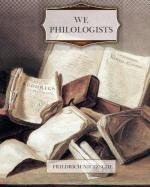Horace was summoned by Bentley as before a judgment seat, the authority of which he would have been the first to repudiate. The admiration which a discriminating man acquires as a philologist is in proportion to the rarity of the discrimination to be found in philologists. Bentley’s treatment of Horace has something of the schoolmaster about it It would appear at first sight as if Horace himself were not the object of discussion, but rather the various scribes and commentators who have handed down the text: in reality, however, it is actually Horace who is being dealt with. It is my firm conviction that to have written a single line which is deemed worthy of being commented upon by scholars of a later time, far outweighs the merits of the greatest critic. There is a profound modesty about philologists. The improving of texts is an entertaining piece of work for scholars, it is a kind of riddle-solving; but it should not be looked upon as a very important task. It would be an argument against antiquity if it should speak less clearly to us because a million words stood in the way!
56
A school-teacher said to Bentley, “Sir, I will make your grandchild as great a scholar as you are yourself.” “How can you do that,” replied Bentley, “when I have forgotten more than you ever knew?”
57
Bentley’s clever daughter Joanna once lamented to her father that he had devoted his time and talents to the criticism of the works of others instead of writing something original. Bentley remained silent for some time as if he were turning the matter over in his mind. At last he said that her remark was quite right; he himself felt that he might have directed his gifts in some other channel. Earlier in life, nevertheless, he had done something for the glory of God and the improvement of his fellow-men (referring to his “Confutation of Atheism"), but afterwards the genius of the pagans had attracted him, and, despairing of attaining their level in any other way, he had mounted upon their shoulders so that he might thus be able to look over their heads.
58
Bentley, says Wolf, both as man of letters and individual, was misunderstood and persecuted during the greater part of his life, or else praised maliciously.
Markland, towards the end of his life—as was the case with so many others like him—became imbued with a repugnance for all scholarly reputation, to such an extent, indeed, that he partly tore up and partly burnt several works which he had long had in hand.
Wolf says: “The amount of intellectual food that can be got from well-digested scholarship is a very insignificant item.”
In Winckelmann’s youth there were no philological studies apart from the ordinary bread-winning branches of the science—people read and explained the ancients in order to prepare themselves for the better interpretation of the Bible and the Corpus Juris.




